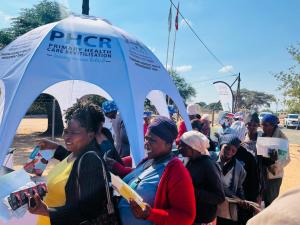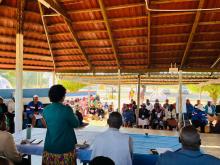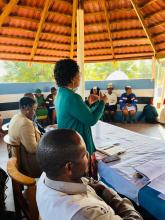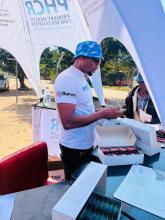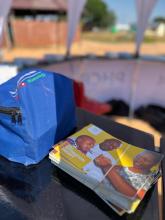Health outreach strengthened during African Vaccination Week in Tsabong
Botswana commemorated African Vaccination Week (AVW) from 24th to 30th April 2025 under the regional theme, “Immunization for All is Humanly Possible.” The weeklong campaign aimed to promote equitable access to immunization and integrate other high-impact child health interventions. In Tsabong District, the AVW activities served not only as an opportunity to provide health services but also to reach some of the district’s most remote and underserved populations.
The district-level commemoration was strategically held in Kokotsha Village, located nearly 200 kilometers from the District Health Management Team (DHMT) headquarters. Kokotsha is home to a largely nomadic population and has historically recorded low immunization coverage, high levels of childhood malnutrition, and limited access to healthcare services. Hosting the event in this community was a deliberate move to bridge health gaps by bringing services directly to those in greatest need.
Although there was no pre-existing planning committee or detailed activity plan prior to the start of AVW, the DHMT managed to coordinate supportive supervision visits and implement outreach in selected facilities throughout the week. A total of seven facilities were reached, offering a range of services including immunizations, vitamin A supplementation, zinc and oral rehydration salts distribution, and community education on exclusive breastfeeding, complementary feeding, hygiene, and early childhood development.
The campaign was met with strong community participation, particularly in Kokotsha, where mobilization efforts proved effective. Health workers were available in most facilities, cold chain equipment was functional, and vaccine stock at the district warehouse was adequate to support the outreach. These positive findings demonstrated the resilience and readiness of the district’s health system despite logistical constraints.
However, several challenges came to light. Some health facilities reported stock-outs of essential vaccines such as the Oral Polio Vaccine (OPV), Inactivated Polio Vaccine (IPV), and Pneumococcal Conjugate Vaccine (PCV), primarily due to inadequate forecasting and distribution inefficiencies. The absence of pre-planned activities and structured implementation plans at both the facility and district levels hampered the coordination and monitoring of AVW activities. Moreover, the lack of defaulter tracking systems made it difficult to follow up with children who had missed their vaccinations.
Additional concerns included inconsistent temperature monitoring of vaccine refrigerators, incorrect use of tally sheets affecting data reliability, and the improper storage of non-vaccine medicines in refrigerators meant exclusively for immunization. Furthermore, logistical limitations, such as a shortage of transport vehicles, restricted outreach services to some remote communities. To address these challenges, the report recommends several actions including targeted capacity-building for health workers on vaccine management and cold chain protocols, establishing a district-level Child Health Committee, and early preparation for future health campaigns such as the Measles-Rubella vaccination scheduled for November 2025. Improving logistical support, especially transport, is also key to strengthening integrated outreach to hard-to-reach areas.
Despite the hurdles, African Vaccination Week in Tsabong marked a significant step toward expanding access to essential health services and building trust in the healthcare system. The event has laid a strong foundation for the upcoming Month of Child Health Days in May 2025 and presents an opportunity to scale up lifesaving interventions for Botswana’s youngest citizens, particularly in communities that are often left behind.
